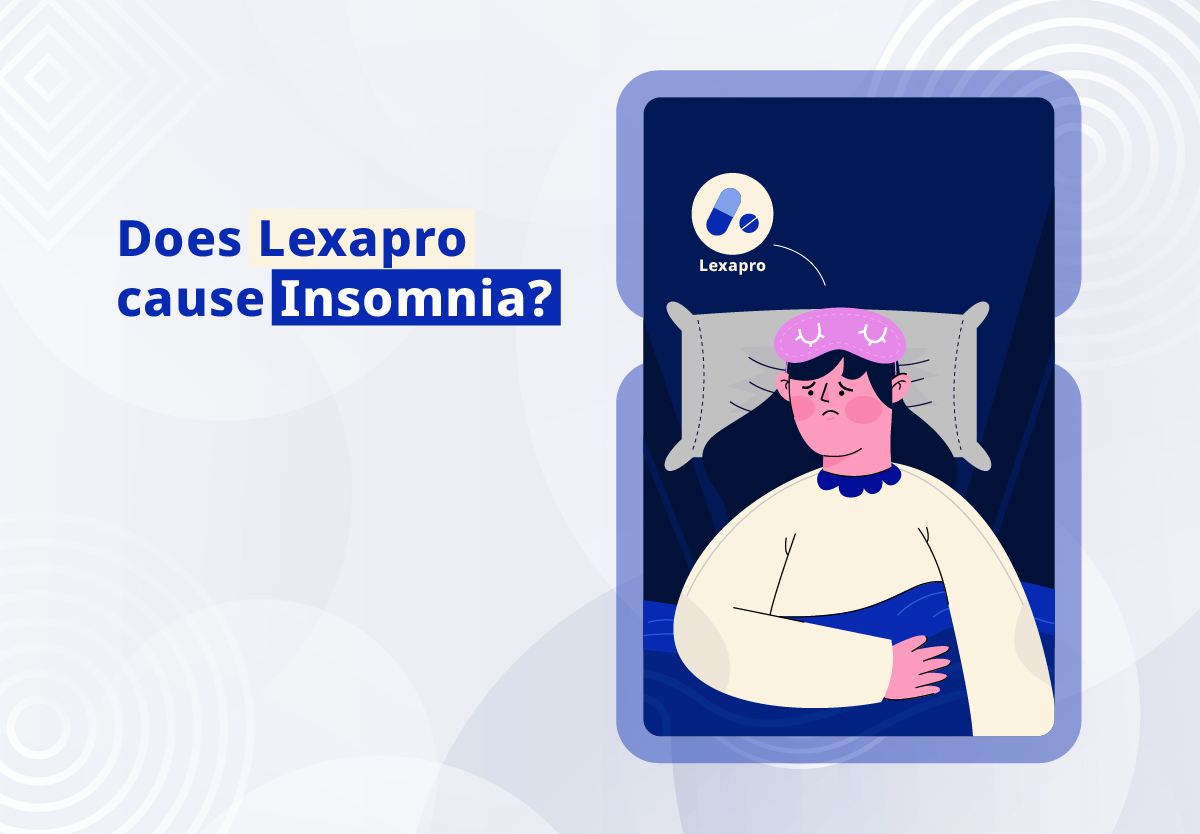A medication like Lexapro (escitalopram) is a crucial tool in the fight against mental health disorders.
This widely used antidepressant is often given for anxiety and depression issues. Despite its effectiveness, some people say it causes a problem – insomnia.
This post aims to dig into Lexapro’s connection with insomnia, providing understanding and handy tips for people dealing with the issue.
Introduction to Lexapro
Lexapro falls in a medicine group called selective serotonin reuptake inhibitors (SSRIs).
It’s mainly used for major depressive disorder (MDD) and generalized anxiety disorder (GAD). It works by boosting serotonin – a brain chemical – which aids in better mood, less worry, and emotional balance.
But, like all medicines, it has possible side effects. Users frequently mention insomnia among these.
Understanding Insomnia
Insomnia is when you have trouble either falling asleep, remaining asleep, or waking up too early with no chance of falling back to sleep.
It can make you tired during the day, affect your mood, and interfere with your daily tasks.
What causes insomnia? It could be anything from stress and worry to bad sleeping habits or health issues. We must first fully understand insomnia in order to figure out if Lexapro plays a role.
Can Lexapro Cause Insomnia? – The Link Between Lexapro and Insomnia
How Lexapro Can Lead to Insomnia
Many users wonder, “Can Lexapro cause insomnia?” The answer is yes, it can.
Not everyone who takes Lexapro will have trouble sleeping, but it’s known to cause insomnia in some people.
A few reasons might be behind Lexapro causing insomnia:
- Serotonin Imbalance: Lexapro boosts serotonin to balance moods. But, serotonin can also impact sleep. An imbalance can disrupt sleep habits, sometimes causing insomnia.
- Activation of the Nervous System: Starting Lexapro or changing the dose can heighten anxiety for some people. More anxiety makes it harder to sleep.
- Delayed Adjustment Period: When the body gets used to Lexapro, sleep issues might arise. This time frame differs, but many people say that their sleep gets better in the end.
Strategies for Managing Insomnia While on Lexapro
If you find yourself asking, “will Lexapro cause insomnia?” and are experiencing sleep issues, here are some practical tips to help manage insomnia:
1. Establish a Consistent Sleep Routine
- Stick to a Sleep Schedule: Going to bed and getting up at the same time sets your body’s internal clock.
- Create a Relaxing Bedtime Ritual: Reading, warm baths, or mindfulness practices tell your body it’s time to relax.
2. Improve Your Sleep Environment
- Keep Your Bedroom Cool, Dark, and Quiet: These conditions are conducive to better sleep.
- Invest in a Comfortable Mattress and Pillows: Your body’s comfort is key to sound sleep.
3. Maintain Good Sleep Habits
- Limit Screen Time Before Bed: Screens give off a blue light that hampers the release of melatonin, this can make falling asleep more difficult.
- Avoid Caffeine and Heavy Meals Late in the Day: Such things could shake up your sleeping rhythm.
4. Think about Supplementation
- Melatonin Supplements: Some people wonder, “can you take melatonin and Lexapro?” Taking supplements is generally seen as safe, but always consult your healthcare professional first.
5. Observe Your Dosage
- Check if Your Dose is Too High: Be mindful of your dosage. Not sure if your Lexapro is interfering with your sleep? Talk it over with your doctor, a change in dosage could do the trick.
6. When to Take Lexapro
- Take Lexapro in the Morning: For some, taking Lexapro earlier in the day can reduce the impact on nighttime sleep.
When to Seek Professional Help
Self-care tactics can work, but recognizing the need for expert advice is key. Watch out for these signs that signal time for a medical consultation:
- Persistent Insomnia: If insomnia continues even after trying several fixes, a health expert may propose more options.
- Severe Sleep Disruption: Incase sleep issues heavily interfere with your day-to-day, tackling them fast is crucial.
- Concerns About Medication: f you think Lexapro may cause your insomnia, your physician could alter your dosage or ponder substitute therapies.
Conclusion and Key Takeaways
To sum it up, Lexapro is often successful in managing anxiety and depression. However, it might lead to sleep issues for some individuals. Figuring out the reasons behind this problem and using sensible tactics can greatly upgrade sleep patterns.
Key Takeaways:
- Lexapro might lead to sleep problems because of uneven serotonin levels or an active nervous system.
- Building a steady sleep pattern and keeping up with good sleep habits are principal methods to tackle sleep issues.
- Seek advice from a health expert if sleep troubles continue or drastically affect your life.
Knowing how Lexapro and insomnia interact lets you act for better sleep. Never forget, caring for your mind and sleep is a process.
Getting expert advice can change everything. If Lexapro is causing you insomnia, contact your healthcare professional. They can provide you with help and advice just for you. Your health is valuable.
For more information and guidance, contact us directly at Esteem Behavioral Health today.
FAQs
Can Lexapro cause insomnia?
Yes, Lexapro can trigger insomnia.
Will Lexapro cause insomnia?
Potentially, some users experience insomnia.
Why does Lexapro cause insomnia?
The exact reason is uncertain, though it might relate to its effect on neurotransmitters.
Can taking Lexapro at night cause insomnia?
Taking it at night could boost insomnia chances.
How long does Lexapro cause insomnia?
Insomnia might persist for a few initial treatment weeks.
How to know if Lexapro dose is too high?
Signs like extreme sleepiness or intense insomnia may point to an excessive dose.
How long does Lexapro stay in your system?
Roughly a week is how long Lexapro remains in your system.
How much melatonin to take with Lexapro?
Consult your doctor for appropriate dosages.


No comment